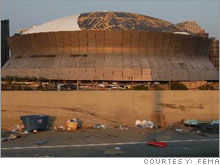 |
| It's not clear if the Saints will ever play in the storm-damaged Superdome again. |
|
|
|
|
|
|
|
NEW YORK (CNN/Money) -
Disaster is a term greatly overused in sports, as the tragedy of Hurricane Katrina reminded us the past two weeks.
And what happens now to New Orleans' two professional teams -- football's Saints and basketball's Hornets -- is clearly not high on the list of concerns.
Nonetheless, the two teams and their leagues face some challenging questions about whether the city will ever be home to major professional teams again, not in small part because it's not clear what the future of pro sports there would have been even before Katrina.
"Everyone knows New Orleans was a marginal major league market," said Gary Roberts, a professor at Tulane University Law School in New Orleans, and an expert in sports business issues. "More and more, the NFL has come to rely on corporate dollars and New Orleans doesn't have a very large corporate base."
In addition, New Orleans was always a small television market.
The Saints at least continued to fill about 99 percent of its seats last year, outdrawing even such stable teams as the Dallas Cowboys and Pittsburgh Steelers.
But the team has been in negotiations with the city and state for years about whether it would stay or go, and the team had an option to get out of the lease at the end of this season.
The Hornets, which moved to town three seasons ago, were last in NBA attendance in the past season, although team spokesman Michael Thompson said the team's season-ticket and group sales had both shown strong improvement.
Sports homes may be beyond repair
The teams' viability in New Orleans is made even more complicated because no one knows yet the extent of damage done to the Superdome, where the Saints play, or the nearby New Orleans Arena, home of the Hornets. It's possible that one or both facilities will need to be replaced.
The teams have not made any announcements for plans beyond this seaon.
The Saints will play four of their games at Louisiana State University stadium in Baton Rouge and three in San Antonio, after being forced to play their "home opener" in New Jersey against the Giants on Monday night. The Hornets announced Wednesday they would play 35 home games in Oklahoma City and six others in Baton Rouge.
But some say that it makes sense for the teams to look at more permanent relocation options.
One thing that could keep the teams in New Orleans is that some cities might be reluctant to make bids. "I think it would be terrible from a public relations point of view for someone to come in and be seen as poaching one of these teams," said Sal Galatioto of Galatioto Sports Partners LLC, a leading investment banker involved in team sales and relocations.
But how long other cities take that hands-off attitude remains to be seen.
One problem with relocating the Hornets is that the NBA is already in just about every market where it makes sense to be (and probably then some).
When Hornets owner George Shinn was basically run out of Charlotte due to battles with the city's leadership and fans, he spent a full season looking at alternatives before settling on New Orleans, as much for lack of a better alternative as anything else.
The Saints would have more interested suitors. Some civic leaders in San Antonio, where the Saints have temporarily moved their base of operations, seem eager to land the Saints for the little-used Alamodome there, which was built in the early 1990s in an unsuccessful bid to launch an NFL expansion team. But that 65,000-seat stadium is smaller than many current NFL stadiums, and has far fewer, and smaller, corporate luxury boxes than found in newer stadiums.
Los Angeles is an obvious candidate, but it also doesn't have an NFL stadium. The moribund Arizona Cardinals are still suffering from moving to a market before an agreement on a new stadium was finalized.
Low priority?
There's also the obvious question if city and state can really afford the time and money needed to build or renovate the facilities needed to keep the teams at home.
"If you have limited resources, where do you put your money?" said Galatioto. "I'm a sports guy and my interest is supporting (sports) buildings. But even I have to say worrying about stadiums is way down the list."
But it's clear that the city will need a lot of help to get its crucial tourism business back on its feet. Mark Rosentraub, dean of the public affairs school at Cleveland State and an expert on stadiums' economic impact, said that this might be one time that a football stadium would be an important economic lift for a city.
"It would be a real major symbol that they're back. The question is if the team would be economically viable, and whether the city is able to support two teams," Rosentraub said.
Rosentraub said the best alternative would be both teams to leave, but for the NFL to make a commitment to the city to put an expansion team back in New Orleans, the way it did to Cleveland after that city lost the Browns. He suggested that a new stadium could be built without tax money, using the expansion fees the league would collect. Rosentraub said he believes a deal along those lines is already being discussed.
NFL spokesman Greg Aiello denied there have been any discussions other than what to do for the rest of this season.
"We're not in any position to answer that question," he said when asked about the future beyond this year. "It's premature and in a lot of ways inappropriate."
For more on the business of sports, click here.

|